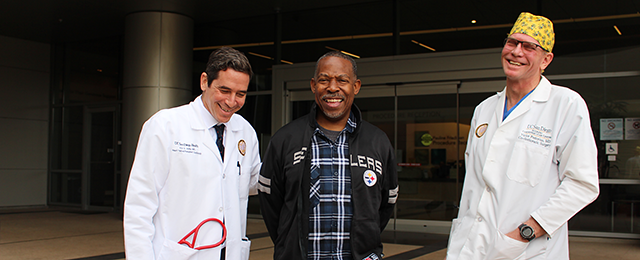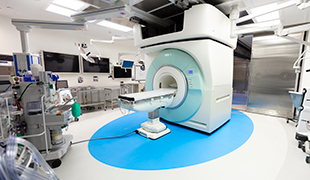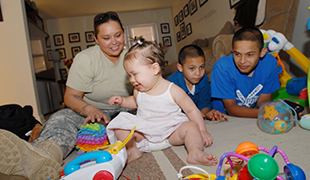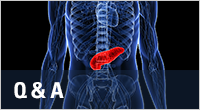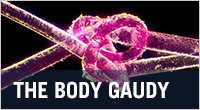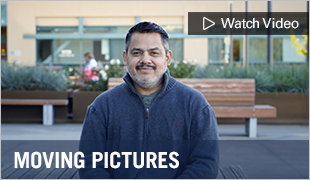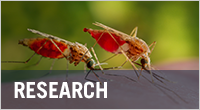|
Problems viewing this email?
View in a browser
|
At 7:30 a.m., Nate Jackson got the call that would save his life and give him a new one, too: a donor heart had become available. The 52-year-old former high school football coach was the 50th patient in 2018 to receive a new organ in UC San Diego Health's heart transplant program, the largest in San Diego and among the biggest in the state.
|
|
|
Jacobs Medical Center at UC San Diego Health boasts the only intra-operative magnetic resonance imaging surgical suites in Southern California, which allow doctors to scan patients without either leaving the operating room.
|
|
A woman's ability to delay and plan for child birth is essential to her health, education and career goals. UC San Diego Health pharmacist Sally Rafie, PharmD, and colleagues are leading several projects to help make birth control more accessible, especially in rural and underserved communities.
|
|
|
Many New Year's resolutions involve getting a new body, or at least an improved version. For most people, that translates into eating better, losing weight or exercising more. For others, it means plastic surgery. A "new" look at the top 10 procedures.
|
|
Every 12 minutes, someone dies from pancreatic cancer in the U.S. The new Pancreatic Cancer Prevention and Screening Clinic at UC San Diego Health aims to improve that stat, helping high-risk patients prevent the disease or detect it early, when treatment is most effective.
|
|
Above is a darkfield micrograph, taken by Harald Andersen of Steinberg, Norway, of a dyed human hair, magnified 40 times. The average, non-follically challenged person has more than 100,000 head hairs, plus another 4.9 million in assorted other places.
|
|
|
January marks 10 months since the All of Us Research Program launched at UC San Diego Health. The program's goal is to speed up health research breakthroughs by asking 1 million or more people to share their health information. Nationally, the program has collected more than 360,000 vials of blood and has recorded more than 200,000 completed online surveys. The California Precision Medicine Consortium, which UC San Diego Health helps lead, has recruited a total of 6,500 participants; 60 percent female. The All of Us UC San Diego Health team is made up of 8 recruiters, 3 on-site phlebotomists and 4 partnering physicians at 3 sites: Perlman Medical Offices, Hillcrest Medical Center and La Jolla Internal Medicine. The team has featured the program at more than 20 local events and handed out more than 5,000 swag items. You can participate at health.ucsd.edu/JoinAllofUs.
|
|
|
After living with debilitating phantom leg pain for 18 years, Raul Silva is excited about a new dorsal root ganglion (DRG) stimulation device that erased his pain during a testing phase at UC San Diego Health, one of the only health care providers in the region offering the device.
|
|
Certified athletic trainers in our Sports Medicine program can work with you to help prevent and recover from injuries and surgery. In the third of four videos, they walk us through shoulder exercises you can do at home.
|
|
|
When used correctly, opioids can be a valuable tool for managing moderate to severe pain. Yet this type of prescription medication, which includes hydrocodone, oxycodone and codeine, is notoriously misused and abused. Pain management specialist Timothy Furnish, MD, describes six ways UC San Diego Health physicians, staff and even patients themselves are making efforts to reduce opioid prescriptions, ensure they are used and disposed of appropriately and get help to those who need it.
|
|
According to the National Human Trafficking Hotline, human trafficking in the U.S. rose by more than 35 percent in 2016. Many victims end up in a hospital, seeking treatment for conditions related to trafficking. In this episode, we talk to Regina Wang, MD; Sarah Williamson, RN; and Karen Mitchell-Keels, RN, who have formed a committee to help educate health care workers about signs indicating a patient may be a victim of human trafficking.
|
|
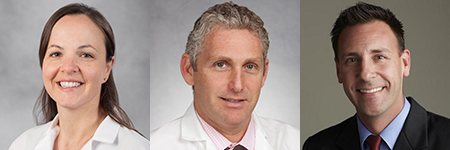
L-R: Kathy Weber, physician assistant; Eduardo Grunvald, MD; Chris W.D. Heichel, MD
|
-
Should I apply ice or heat to my injury?
-
What is the ideal weight?
-
Is it safe to sleep with contacts?
|
|
Making New Year's resolutions may be an exercise in futility, but they don't have to be unattainable, especially when it comes to fitness. Suzanne Smith, RD, sports dietitian at UC San Diego Health, offers nutrition guidance to support three different fitness goals, whether you're wanting to eat better (fit), trying to lose some weight (fitter), or training for a marathon (fittest)!
|
|
|
You are receiving this email because you subscribed to our newsletter or you attended a UC San Diego Health event.
You may unsubscribe by using the links below.
|

